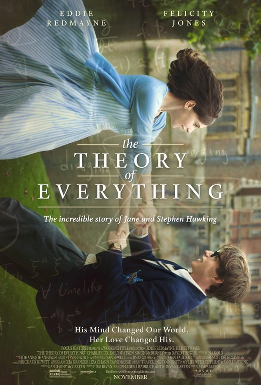Can science and faith co-exist? That's a debate for another website. Can science and love co-exist? Uh, yeah, I guess. Don't believe me? Watch this movie. Why? Because that's all the research I have.
The Theory of Everything examines the true story of Stephen Hawking, the world-famous astrophysicist who developed Amyotrophic lateral sclerosis (ALS or Lou Gehrig's disease) in his early twenties. As Hawking dealt with the grave difficulties of this disease, he had great help from his wife Jane while he tried to crack the biggest mysteries of science"”time itself.
The film is based on Jane's novel Travelling to Infinity: My Life with Stephen. The film shows us the allure of young love and the vast valleys of marriage, which test the virtue of, "In sickness and in health". Eddie Redmayne is stunningly uncanny as Hawking. It takes great range to believably pull off the transformation he goes through. And in many ways, it's his presence that makes it feel like we're experiencing Hawking's actual memories instead of a movie. Felicity Jones' performance is also excellent as Hawking's steadfast but overwhelmed wife Jane. The film's score is soulfully resonating and engulfing. It's meant to make you feel sympathy for Hawking, but it's effective and moving. Also, the film is artfully shot with a soft focus touch and hyper-saturated colors to invoke the energy and dreariness of Hawking's past.
However, as beautiful as the film looks, it loses its authenticity for everyday life by overly relying on sweeping, epic camera shots. As for the movie's plot, I didn't have many issues with it after watching the film initially. But I was curious to see how the film closely resembled the actual story. Now most biopics don't get all of the facts right and that's okay"”unless it leaves out very important info that the film actually goes through. Most biopics also tend to paint their main character in a positive light rather than an adulterated one, and this movie is no different.
As I did some fact checking, it turns out that Hawking had some issues with certain elements of his marriage that the film decided to glaze over; particularly, Hawking's true feelings about Jonathan Jones, another major character. The conflict in Hawking's marriage is a key part of the film and for the filmmakers to make Hawking in the film do the opposite of what he really did is very puzzling. If they actually explored those raw and relatable human emotions, they would have conveyed an authentic human response rather than a passive, fictitious, pseudo-forgiving attitude. This cheapens a drama that is already dealing with a conflict that is as old as time.
For those who want an in-depth look at Hawking's physics work, sorry! This story's about love. But unfortunately, this isn't a documentary, and ironically, this film was directed by James Marsh who won an Academy Award for his documentary Man on Wire in 2008. Marsh knows how to make an interesting story even more than it actually is, and that's a rare gift for a filmmaker. I don't have any theories about this movie, but a law and that law is"¦ this movie is very good.

